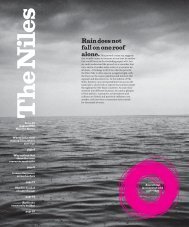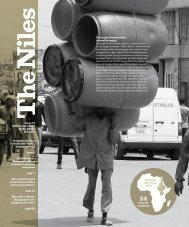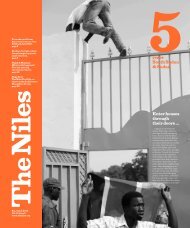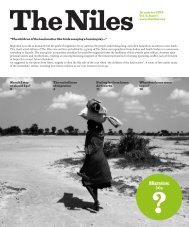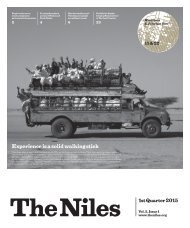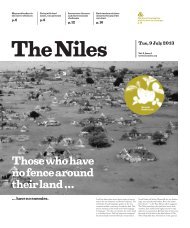When deeds speak, words are nothing
Speaking about sustainable development is easy. Acting sustainably is another matter. And now the evidence is unequivocal: Mankind’s impact on nature is causing the climate to change rapidly and drastically, threatening the environment and the very resources we need to survive. Aware that humanity is careening close to the edge, The Niles correspondents set out to explore where and how people in the Nile Basin region rethink. So much of their findings for now: We are an endlessly innovative species. Cooperation is our superpower. When deeds speak, words are nothing.
Speaking about sustainable development is easy. Acting sustainably is another matter. And now the evidence is unequivocal: Mankind’s impact on nature is causing the climate to change rapidly and drastically, threatening the environment and the very resources we need to survive. Aware that humanity is careening close to the edge, The Niles correspondents set out to explore where and how people in the Nile Basin region rethink. So much of their findings for now: We are an endlessly innovative species. Cooperation is our superpower. When deeds speak, words are nothing.
Create successful ePaper yourself
Turn your PDF publications into a flip-book with our unique Google optimized e-Paper software.
For years, waste, which has been a problem
for contemporary Egyptian society, has become
the focus of many investors, who have woken
up to the economic and environmental importance
of recycling and converting waste into
raw materials. These are used in many industries
and are even exported. It is estimated
that the volume of waste in Egypt amounts
to around 22 million tonnes annually, and less
than 20 percent of this is appropriately disposed
of or recycled.
Greater Cairo (Cairo, Giza, Qalyubia), and
Alexandria generate almost half of the country’s
municipal solid waste created per year.
“I felt that I could do
something important.”
Egyptian mothers used to recycle garbage
and leftover products in the past, especially
during the two world wars. Warfare left little
material resources for the civilian population,
and it became necessary for most homes
to recycle their waste.
Although the wars are long ago, a new
generation earns a living from recycling,
spreading awareness about recycling to
safeguard the environment.
One of them is a housewife, Basma, who
is 28 years old. She never studied art, but she
observed how her mother would reuse the
thrown away items. Following her lead, Basma
collected anything she was able to decorate.
“When I finished my first product, I felt that
I could do something important. This makes
me happy, and I have the courage to teach my
child how to make things before throwing them
in the garbage,” she says.
Continued on page 14 13









